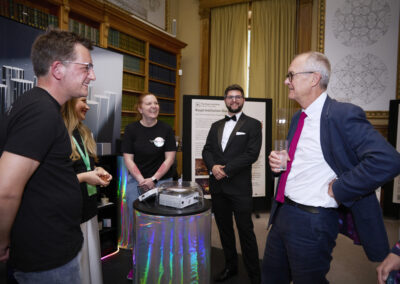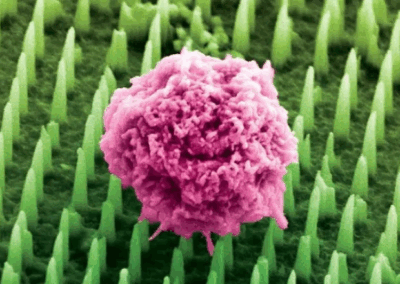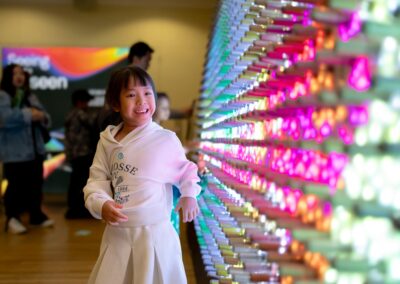Professor Sandrine Heutz, Professor of Functional Molecular Materials in the Department of Materials has accepted appointment as Director of the London Centre for Nanotechnology at Imperial College London. Professor Heutz will succeed the current Director Professor Milo Shaffer who has been in the role for the last 10 years. We had a short interview with Professor Heutz to find out more.
How long you have been at Imperial?
I came to Imperial in 1998 to do my PhD in Chemistry under the supervision of Tim Jones – who would become the first Imperial LCN director! Unwittingly cementing LCN links, I went to UCL for my fellowship in 2004-2007, working closely with Gabriel Aeppli, the first UCL LCN director, and Andrew Fisher, who is now at the helm. I came back to Imperial for a lectureship in the department of Materials. So on and off, I have been at Imperial for about half my life!
What is your research background?
I trained as a chemist at the University of Liège in Belgium, and the University of Sherbrooke, Canada. I was interested in surface science and therefore studied growth and characterisation of molecular semiconductor thin films for my PhD, moving onto their applications in photovoltaic devices during my post-doc. This training has given me a passion for both fundamental science and technology at the nanoscale.
Tell us about what your current research is focused on?
My research group is using interdisciplinary approaches crossing chemistry, physics, materials science and engineering to understand and exploit molecular properties for device applications. In particular, we are looking at new ways to store and transmit information, and to harvest or save energy, using molecular semiconductors. Molecules have a footprint of only one nanometre and are therefore the perfect nano-object. We process them in thin films and nanostructures and control their local environment within a solid framework so that we can tune their many degrees of freedom: the electronic charge and spin, the optical properties, vibrational modes, etc.
Are there any recent positions and titles that you hold?
I have been part of the Strategic Advisory Team for Physical Sciences at EPSRC for the last three years and have just been appointed Chair. This position is a really great opportunity to get an insight into the UK research landscape and to think about ways of maximising research excellence across the wider research community. More locally, I am also the champion for SPIN-Lab, an open multi-user facility dedicated to the study of spins, their environment and their interactions.
What are you looking forward to bring to the role?
I am committed to driving research excellence through collaboration, mentorship, and advocacy. I also care very much about communication and outreach and I hope that we can further expand the meaning of “nanotechnology” today. Nano used to be a buzzword and thanks to its many successes it is now pervasive in our everyday life – hiding behind the increasingly efficient devices, or faster medical diagnostics. This doesn’t mean it is any less important – quite the opposite!
My group’s work overlaps with many of the LCN key themes, but of course this role is about more than my direct research interests; running a research facility has hopefully taught me how to be a facilitator as well as a collaborator, and to understand the strategic needs of the community.
How are you feeling about being the new Director of the Centre at Imperial?
I am hugely excited about taking on this new role, as I have been such a fan of the LCN since its inception. To me the LCN is a place of excellence, creativity, collegiality, enterprise, scholarship, collaboration and friendship. This is down to all the incredibly talented researchers in the LCN, but also to the vision and leadership of previous directors – I plan to build on these foundations. The LCN has recently expanded with King’s College joining Imperial and UCL in 2018, and this brings many opportunities to foster new avenues of joint research, as well as links to other centres across the UK and further afield.
How you would like the LCN to impact its community?
On the local level, there are many practical aspects in which the LCN can impact researchers – through access to state-of-the-art equipment and joining regular seminar series for example.
More broadly, I hope the LCN can act as a platform to showcase and promote nanotechnology – we need to understand the nanoscale now more than ever. I also hope that by interacting through and with the LCN, researchers will be better able to tackle “big ideas” that address the challenges of today’s society, and to expand our fundamental understanding of the world. On the most urgent matters of today, LCN researchers are working to tackle our response to COVID19. More broadly, it is exciting to see LCN contribute to initiatives such as Imperial’s zero pollution, and the long-term impact of our work on the environment should be central to how we develop research.



